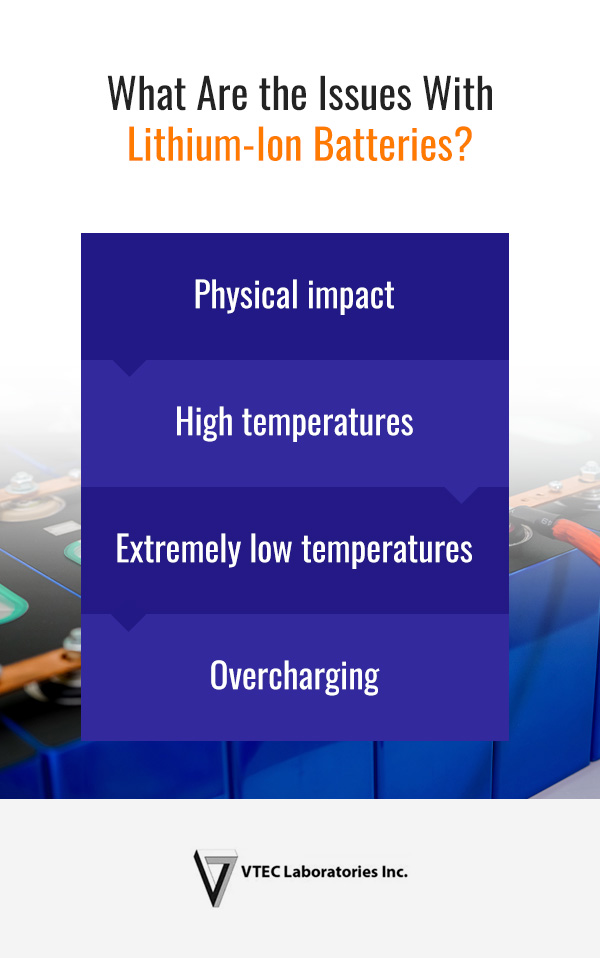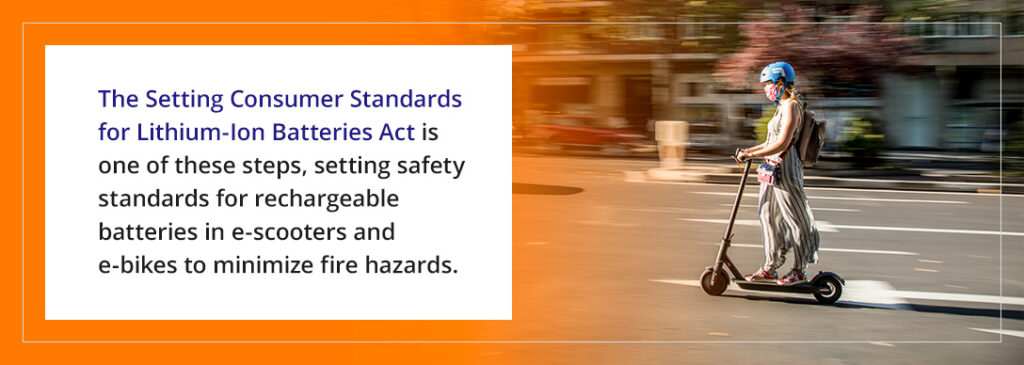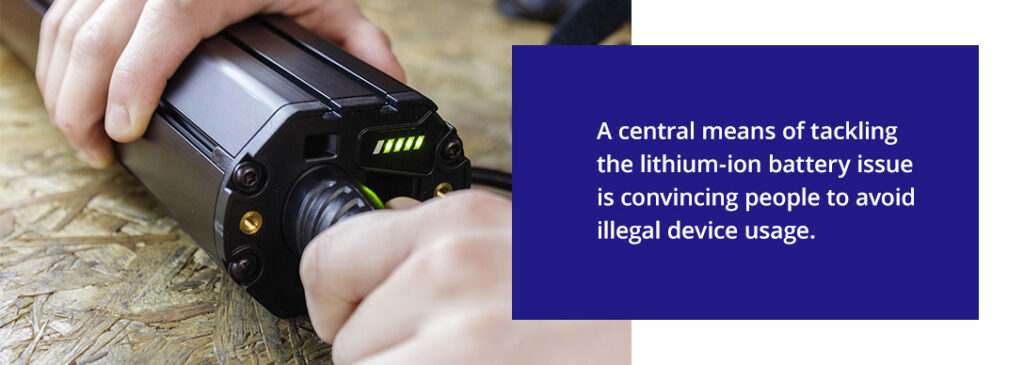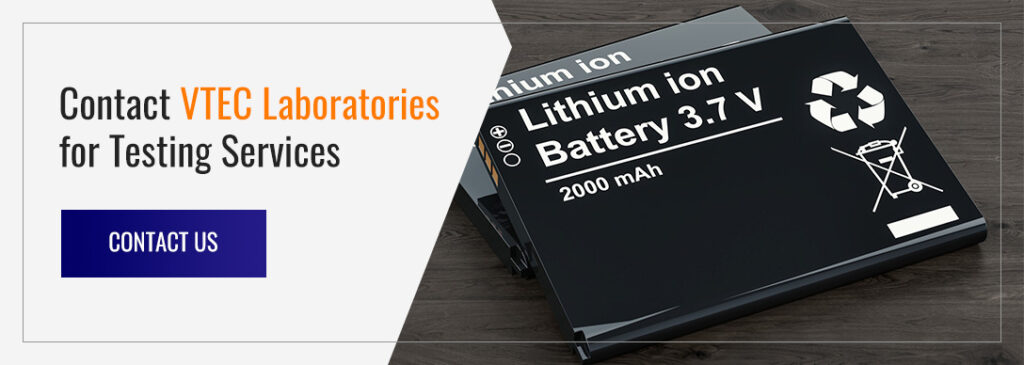Lithium-Ion Battery Fires
Lithium-ion batteries are rising in popularity due to their superior performance and long-lasting capabilities. However, these batteries present several safety concerns for people, especially those who use electronic mobility devices in New York City. Over the last few years, incidents of lithium-ion fires have increased, resulting in injuries, property destruction and death. Learn more about lithium-ion batteries, including how to prevent these fires, the specific problems we’re facing and how New York City proposes to tackle the issue.
What Is a Lithium-Ion Battery?
Lithium-ion batteries are advanced technology that uses lithium ions. The lithium atoms ionize and separate from the electron during the discharge cycle and move away from the anode to reach the cathode after passing through an electrolyte. At this point, the ions become electrically neutral by reconnecting with electrons.
These rechargeable batteries have a high energy density and can deliver more volts than other technologies. They also have a low self-discharge rate and do not contain toxic cadmium, making them easier to dispose of than other batteries. These features have empowered lithium-ion batteries to appear in many portable devices like laptops and smartphones. Their light weight also makes them appealing for other uses. For example, you can find e-scooters with lithium batteries for easy transport.
However, these batteries also have disadvantages that make them less appealing, and people are growing increasingly aware of the safety concerns. For instance, lithium-ion batteries can overheat and experience damage at high voltage. Additionally, these batteries can fail due to aging. Despite their pitfalls, lithium-ion batteries also remain more expensive than other options.
What Are Common Lithium-Ion Battery Uses in New York?
You can find lithium-ion batteries in various products, including:
- Toys
- Appliances
- Electronics
- Power tools
- Headphones
- Electric vehicles
- Energy storage systems
These lighter and smaller batteries are compatible with many applications, and there has been a significant increase in cordless and portable products using them. Lithium-ion batteries may be removable, but sometimes they are not. For instance, removing the batteries from a child’s toy may be easier than from a tablet or e-reader.
Some of the most common lithium-ion battery uses include:
- Getting around the city: An electric bike battery can last hours, allowing people to navigate the busy city streets easily. The lightweight construction makes it easy to carry the batteries indoors to recharge them whenever needed. These batteries can also power scooters, wheelchairs and stairlifts, empowering more people to live independently.
- Portable charging packs: Long days out and about can become much more manageable with a portable charging pack. People can quickly charge their phones, tablets and smartphones without needing an outlet or having to remain in the same location while their devices power to full battery.
- Smartphones, laptops and other devices: Many manufacturers use lithium-ion batteries to power portable devices due to their long-lasting durability, lightweight construction, high energy densities, easy charging and low maintenance costs.
- Fitness trackers and watches: Low-drain watches can benefit from lithium-ion batteries, allowing them to live for up to a decade with proper care. People who use fitness trackers or have a tight schedule can rely on their watch’s long-lasting battery life.
- Pacemakers: People who rely on pacemakers can use lithium batteries to ensure a long life span for the device. The low weight can make it more comfortable to wear.
- Digital cameras: Cameras need high energy density power sources to function correctly, and lithium-ion batteries provide an excellent solution. The superior battery performance and transferability make these batteries a great option for photographers or travelers looking to upgrade a camera while using the same battery.
What Are the Issues With Lithium-Ion Batteries?

Most lithium-ion batteries will work well unless there is a defect or the battery receives damage. Unfortunately, dangerous situations can arise in these circumstances, including fires or explosions. Improper use, charging or storage can also lead to battery failure, and this damage can happen over time or immediately. Here are some of the common causes of damage to batteries:
- Physical impact: Dropping, crushing, puncturing and other forms of physical impact can cause your battery to experience damage that leads to failure.
High temperatures: External heat sources, such as heaters and open flames, can quickly cause battery failure.- Extremely low temperatures: Below-freezing temperatures can result in metallic lithium buildup that increases failure risks.
- Overcharging: Manufacturers’ manuals and instructions describe the proper charging techniques. Using generic or ultra-fast chargers may not allow power to cycle correctly and lead to overcharging and overheating. Only use the chargers described in your instruction manual.
Safety Concerns
Lithium-ion battery safety concerns center around the fires and explosions that can occur. Lithium-ion batteries present challenges for storage, handling and use due to the high energy densities and flammable organic electrolytes. When damage occurs, these batteries can create disastrous fires you cannot put out with a fire extinguisher.
Imperfections and contaminants in manufacturing processes can lead to a thermal runaway, resulting in vaporized electrolytes. This process also builds pressure in the cell casing. When the case fails, the gases are released. These highly toxic and flammable gases present a dangerous situation for anyone nearby. Depending on the battery size, construction and state of charge, thermal runaway can result in thick smoke, flames resembling flares, fireballs or explosions.
New York-Specific Concerns
Although lithium-ion batteries are in many products, New York faces an unusual challenge with these batteries. E-bike fires have drastically increased in New York City due to battery overheating and malfunctions.
Recent incidents have left many people with injuries. In March 2023, an e-scooter explosion in the Bronx left at least seven people with injuries. In another incident a few weeks later, an e-bike fire caused an explosion at an upper building level, blocking the exit. In late 2022, nearly 40 people obtained injuries from a lithium-ion battery in a micromobility device that caused an apartment building fire in Manhattan.
During the first half of 2023, these batteries caused at least five deaths and more than 60 fires.
These sudden instances can be hard to predict, and average consumers don’t know how to detect possible threats. Another significant issue New Yorkers face is uncertainty about where the batteries come from. With millions of people entering the state each year, it can be challenging to determine which batteries are safe and which pose a threat. Federal legislation is the best way to combat these issues.
What Are New York Officials Proposing?

Electric mobility is crucial to many New Yorkers’ lives, and finding sustainable and safe practices is critical for everyone’s health.
Representatives are taking several steps toward lithium-ion battery safety. The Setting Consumer Standards for Lithium-Ion Batteries Act is one of these steps, setting safety standards for rechargeable batteries in e-scooters and e-bikes to minimize fire hazards. This federal legislation would remove faulty lithium-ion batteries from the market and create guidelines to protect people from deadly explosions.
In March 2023, Mayor Eric Adams also announced a plan to protect New Yorkers. The plan, Charge Safe, Ride Safe: New York City’s Electric Micromobility Action Plan, promotes safe battery use, increases education to micromobility users, expands enforcement against dangerous situations and advocates for federal regulation of lithium-ion battery-powered devices.
Supporting Legal and Safe Micromobility Use
The Charge Safe, Ride Safe plan specifically addresses methods of charging and storing lithium-ion batteries. Improper storing and charging practices can quickly lead to battery fires, so this legislation aims to:
- Incentivize legal and safe purchases of e-scooters, e-bikes and other electric micromobility devices by designing and implementing new programs.
- Provide safe places for delivery workers to charge their devices and rest throughout the city.
- Create outdoor charging and storing solutions in Queens, Manhattan and Brooklyn and apply for federal funding and grants to support these solutions.
- Evaluate, test and identify battery-charging solutions to invite startup charging technology companies to deploy products at supported locations.
- Examine and test fire prevention and safety in commercial settings and homes.
Increasing Outreach and Education About Safe Usage
A significant focus of this plan is to expand outreach efforts to educate people on safe charging, usage and storage practices. Currently, the plan aims to grow engagement in worker and immigrant communities and other locations most affected by lithium-ion battery fires and explosions.
Another element of the plan offers to provide safety training through Ready NY Platforms and Community Emergency Response Teams. Along with professional development, everyday citizens can also seek essential information from these programs to stay safe at home. Other training sessions will also include best practices for fire safety regarding these batteries and e-devices.
Supporting Safe Cycling and Micromobility Growth
As a leader in sustainable transportation, the people of New York recognize the importance of micromobility devices for getting around efficiently, affordably and safely. This plan seeks to prevent lithium-ion battery fires and make using these mobility devices easier and safer.
Part of this plan involves launching a program to allow electric micromobility devices on greenways and park drives. Additionally, the plan seeks to update several street designs to accommodate e-scooter and e-bike transportation on the road. Throughout this program, new street designs and policies will come to light and offer travelers a safe way to commute.
Advocating for Legislation

A central means of tackling the lithium-ion battery issue is convincing people to avoid illegal device usage. The Charge Safe, Ride Safe plan aims to create a task force to identify fire code violators. The data this task force collects will empower responders to identify potential high-risk situations and locate hot spots to target locations needing outreach efforts and fire code inspections.
The plan also highlights intentions to continue advocating for legislation to ensure available devices meet safety standards. Furthermore, building local, federal and state partnerships will guide research on first responder health impacts from handling lithium-ion batteries and how to combat these issues.
Preventing Lithium-Ion Battery Fires
With the increasing lithium-ion fires in New York City, taking proper precautions is essential for minimizing the possibly deadly consequences. These battery fires have begun in many devices, including scooters, bikes, phones, laptops and other common household devices, leading to injuries, property damage and death around the city. Take a look at these fire prevention tips to avoid these situations for your devices:
- Refer to the manufacturer’s manual and instructions for charging and storage information.
- Only use and purchase devices with certification from a testing laboratory.
- Always use the correct power adaptor, charging cord and battery for your device.
- Ensure your battery remains at room temperature.
- Never store your batteries near flammable objects.
- Avoid placing batteries near heat sources.
- Refrain from using generic chargers or batteries.
- Never dispose of batteries in a recycling or trash bin.
- Always be nearby your e-bike or scooter when charging it.
- Never charge your batteries for long periods, such as throughout the night.
- Refrain from placing devices with these batteries near couches, on your bed or under your pillow.
How VTEC Laboratories Can Help the City of New York
VTEC Laboratories is a leading international commercial and testing service. We’re a multifunctional company with several testing capabilities, including labeling, listing and follow-up inspections. We conduct safety tests for Los Angeles, Wisconsin, Denver, San Francisco and New York City.
We understand the importance of fire safety codes, safety standards and industry regulations. Our flammability testing services allow you to understand how objects and materials behave under various conditions.
Lithium-ion battery testing can save lives by preventing unnecessary explosions. Testing is a long- and short-term investment that can make products more versatile and more likely to reach various markets while offering you a better understanding of potential fire hazards.
We provide testing services to ensure products meet safety standards and industry regulations. With over 30 years of experience and worldwide support, we can meet all your fire testing needs efficiently and quickly. Our testing offers insight about:
- Flame spread: We use several techniques to determine a material’s tendency to spread flames. We identify how far the fire can spread and provide insight into how the fire spreads on the product.
- Fire reaction: This test shows what occurs to a material’s consistency, form and rigidity when it encounters a fire. It will also show how the product’s decomposition affects the flames.
- Fire resistance: We use this test to determine a material’s ability to resist catching fire and withstanding flames. This test provides a time rating to evaluate how long the material can withstand a fire. You can use this to determine whether consumers will be able to reach safety or extinguish the fire, as longer times increase the chances of resolving the situation before it becomes hazardous.
Contact VTEC Laboratories for Testing Services
VTEC Laboratories is an expert in flammability testing and fire testing. We’re a certified industry leader, and our expert services empower businesses to understand their products, meet safety standards and satisfy industry regulations to keep consumers safe.
We can help solve New York lithium-ion battery issues by offering superior service for lithium-ion battery testing. Our certifications and accreditations ensure compliance with federal, state and local codes as needed. Contact us for a service quote to test your materials and products.

